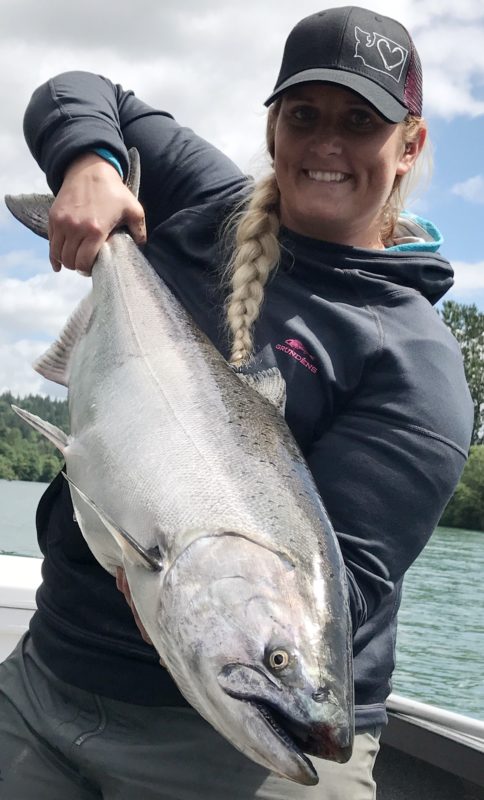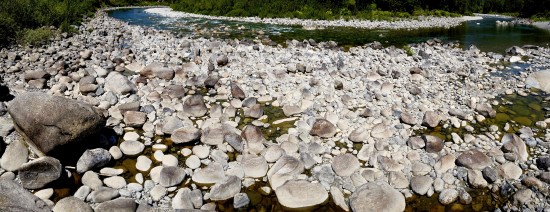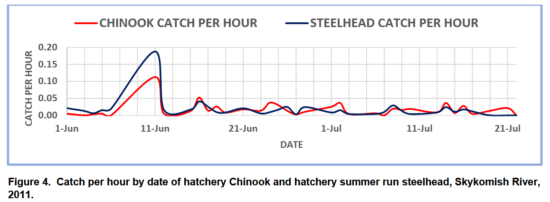
WDFW Commission Denies Petition To Restrict Popular Skykomish Fisheries
A utility district’s petition to restrict bait fishing for half the year and delay the opening of the summer Chinook and steelhead season on Washington’s Skykomish was rebuffed by the Fish and Wildlife Commission late last week.
That left local anglers like Mark Spada breathing a sigh of relief for the moment.
“The sportfishing community worked very hard to educate the commission to the importance of this last-of-its-kind fishing opportunity for the North Sound,” said the president of the Snohomish Sportsmen’s Club. “Thankfully they listened, and voted to deny this uninformed petition by the PUD.”

But the citizen panel did ask WDFW to consider the request during the upcoming North of Falcon salmon-season-setting process, where fishing rules for 2020-21 will be determined through preseason forecasting and consultations with tribal comanagers before approval by federal overseers.
The petition came from the Snohomish County Public Utility District, which is concerned about wild steelhead recovery in the watershed, where it operates a dam it has to mitigate for.
Speaking for the utility, fisheries biologist Larry Lowe asked the state agency to enact selective gear regulations from July 15 through January 31 and push the summer opener back two to three weeks to June 15.
Lowe said that despite enhancement projects on the Skykomish and its tributary the Sultan, where PUD’s dam, hydropower facilities and reservoir are, native winter-run returns have declined to “an alarmingly low level,” with just 178 and 55 back to the mainstems of both rivers, respectively, this year.
And he said that the fishery for hatchery kings and summer-runs is impacting pre- and postspawn wild winters, as well as outmigrating smolts.
“Wild salmon and steelhead face many complex and costly challenges on the road to recovery. The requested rule changes are neither complex nor costly and will continue to provide ample fishing opportunity for recreational anglers as well as provide the resource protections needed for species recovery,” Lowe wrote.
But WDFW’s regional fisheries manager Edward Eleazer says the fishery comes in well below allowable impacts, and he points to greater threats to the steelhead stock than angling.
“Major pressures for steelhead are harbor seals, habitat degradation and climate change,” he told the commission during its Nov. 15 conference call.
The pinnipeds have been identified as eating large numbers of outmigrating salmonids in Puget Sound.
PUD’s Diversion and Culmback Dams have blocked all fish passage to most of the Sultan for decades, and much of the Sultan and Skykomish watersheds outside of three wilderness areas have been heavily logged, dumping sediment into the rivers. In the valley, dikes armor banks to protect the BNSF rail line, farms and towns.
Eleazer pointed out to commissioners that the Skykomish fishery is operated under a comanager agreement, and is authorized by the National Oceanic and Atmospheric Administration to have a maximum impact of 4.2 percent on wild winter steelhead.
“Recent estimates by NOAA say we’re more like 1.6 percent, so the impacts on steelhead are negligible and not severe like the petitioner is claiming,” Eleazer said.
He said the proposed rule changes would “significantly affect hatchery Chinook and hatchery steelhead fishing.”
It’s fair to say that the Skykomish is where anglers are digging in their heels.
“The fact that the smolt mortality and wild fish encounters were below the allowable minimums as outlined by the NOAA permit for this fishery gave PUD no legitimate case for the rule change they were petitioning for,” argues Spada.
In this era of decreased hatchery releases and salmon and steelhead fishing opportunities, the Sky is the last bastion of consumptive angling in Puget Sound. It’s the only river north of the Cowlitz where Chinook and steelhead can be kept in June and July.
It’s the river that WDFW prioritized in the Chambers Creek early winter steelhead settlement with the Wild Fish Conservancy, and it’s the one they’ve come up with a plan for saving the summer steelhead fishery out of another WFC lawsuit.
Just under 500 Chinook and 1,573 steelhead were caught on the Sky during 2017’s summer fishery, according to WDFW’s 2017 sport catch report, the most recent available, along with 1,863 winter steelhead during the fall-winter season.
While eggs and sand shrimp are popular and productive offerings for summer kings, coho, chums and both summer and winter steelhead, under selective gear rules bait and scents are prohibited. Anglers are also limited to lures with single barbless hooks (except plugs), and required to use knotless nets.
Eleazer acknowledged that PUD is an important stakeholder in fishery issues in the Skykomish watershed, and the county agency does a lot of steelhead and salmon habitat and recovery work.
“One of the reasons why they’re so alarmed, and our staff is alarmed as well, is because of the extreme drought and climate conditions that we saw in 2015,” he said. “And so the salmon and steelhead returning this year, their parents came into the system during 2015 and it wasn’t very hospitable for them to survive. Very low numbers are coming back this year because of the climate change environmental situation, so they’re kind of waving the red flag.”
That year was when the effects of The Blob — the giant pool of overly warm water in the North Pacific — really hit Northwest rivers hard, with little winter snowpack and hot air temperatures leading to an early meltout and record low flows through summer.
I chronicled those impacts in a photographic survey of the Skykomish that summer, when on July 18 the river was flowing at a mere 425 cubic feet per second, 2,700 cfs below average and twice as low as the old record minimum for the date, set back in 1940 — extraordinary numbers.

Over on dewatered Olympic Peninsula streams, WDFW biologists observed where wild winter steelhead redds had been dug up by raccoons to get at the eggs.
Unfortunately the snow drought was followed by major fall floods. The Skykomish saw crests of 70,000, 60,000, 95,000 and 80,000 cfs at Gold Bar in a six-week period, which didn’t do salmonids any favors either.
Eleazer said that it appears PUD is more focused on recent abundance trends, and it’s true, those don’t look good.
Where once there were enough winter steelhead to hold a coveted March-April catch-and-release season on the Sky, overall Snohomish-Skykomish Basin returns have dropped from 4,132 as recently as 1998 to 1,188 in 2014 to 372 in 2018.
He said that PUD was also “very upset” about this year’s May 25 start of the Skykomish fishery, seven days earlier in the past, a change that came about through WDFW’s rule simplification efforts which affected hundreds of flowing waters statewide and moved the traditional Sky opener from June 1 to the Saturday before Memorial Day.
In 2020, the Saturday before the holiday falls on May 23; in 2021, the 29th; in 2022, the 28th, etc.
According to Eleazer PUD didn’t submit comments on the late May opener, but Lowe’s petition states that as much as 43 percent of the Sultan’s wild winter redds are dug after the 25th of the month.
And Lowe says that outmigrating steelhead, coho and Chinook smolts “are vulnerable under a May 25 opener. This would not be the case with a mid-June opener.”
PUD’s crunching of 2011 WDFW creel data shows that king and steelhead catch rates spike from June 6 to 11, consistent with the early 2000s.

The mouth of the Sultan, where a popular put-in/take-out is located, also acts as a thermal refuge because the tributary dumps in water that’s cooler than the Sky, Lowe says.
Hatchery steelhead haven’t been released in the Sultan in more than a decade as WDFW moved away from off-station stocking, and the agency also scaled back the period that gold mining can occur between the site of the old Diversion Dam, at river mile 9.7 and which came down in 2017, and Culmback Dam to the month of August.
Before filing their petition, Lowe and utility managers took to print and the airwaves in early June rather than work with local anglers, and that didn’t sit well with Spada, and the whole thing still doesn’t.
“It continues to mystify me why the PUD thinks that they are in control of wild fish management on the Sky, and want to point fingers of blame at the recreational fisherman when they have made no attempt to be part of the solution, or work together with all interested parties for common sense management,” he says.
Eleazer told the commission that to his knowledge, PUD has not talked with the Tulalip Tribes, which comanage fisheries in the basin, and that conversations have been limited to the utility, his agency and the Wild Fish Conservancy.
Before voting to deny the petition, Fish and Wildlife Commission members debated whether to include specific direction to WDFW staff to consider the requests during North of Falcon.
Some, like Vice Chair Barbara Baker of Olympia and Kim Thorburn of Spokane wanted to, while others like angler advocate Dave Graybill of Leavenworth said it wasn’t necessary because it was already part of NOF.
Ultimately, an amendment to do so was included in the vote denying PUD’s petition.
NOF begins again in late winter, with multiple chances to comment on any proposals that come out of it.
